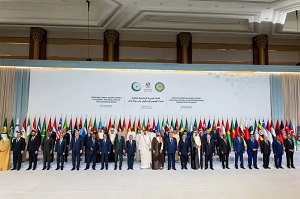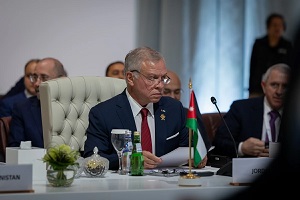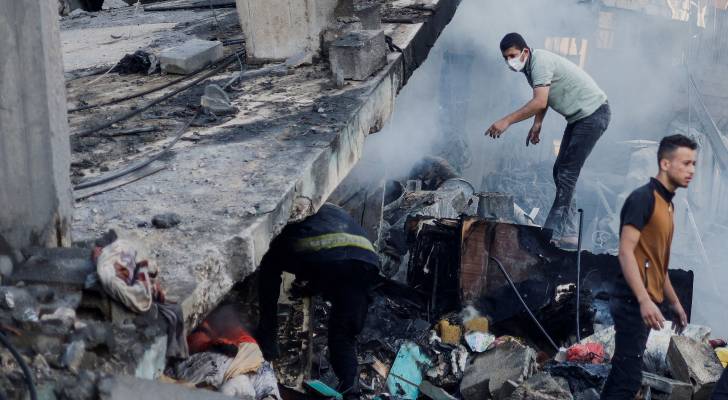As UN declares famine in Gaza, legal expert urges global boycott of Israel
AFP
AMMAN — The United Nations has formally declared a famine in Gaza, marking the first such recognition in the Middle East and underscoring what international agencies describe as a "humanitarian catastrophe of epic proportions."
According to the UN’s Integrated Food Security Phase Classification (IPC), a system used by UN agencies and international NGOs to analyse and classify the severity of food insecurity and acute malnutrition, more than half a million Palestinians are already facing catastrophic levels of hunger. As of late September, official UN projections placed 640,000 people in IPC Phase 5 (catastrophic), 1.14 million in Emergency (Phase 4), and 396,000 in Crisis (Phase 3).
UN Under-Secretary-General for Humanitarian Affairs and Emergency Relief Coordinator Tom Fletcher said, “It is a famine that we could have prevented, if we had been allowed. Yet food stacks up at borders because of systematic obstruction by Israel.”
Meanwhile, Food and Agriculture Organisation (FAO) Director-General QU Dongyu said, “People in Gaza have exhausted every possible means of survival. Hunger and malnutrition are claiming lives every day, and the destruction of cropland, livestock, greenhouses, fishery and food production systems has made the situation even more dire.”
The crisis has also deepened across all sectors. According to UNICEF and UNRWA, 98.5 per cent of Gaza’s cropland is either damaged or inaccessible, and nine out of ten residents have been displaced. The UN Office for the Coordination of Humanitarian Affairs (OCHA) also said that “More than 12,000 children under five were diagnosed with acute malnutrition out of 136,000 screened, a sixfold increase since January. Of these, more than 2,500 children were suffering from severe acute malnutrition, the most life-threatening form, with at least 40 requiring hospitalisation in stabilisation centres."
Access to clean water has also been severely disrupted. The Office of the High Commissioner for Human Rights (OHCHR) said that since October 2023, Israel’s military operations have repeatedly targeted water facilities, wells, pipelines, desalination units, and sewage systems. "Eighty-nine per cent of Gaza's water and sanitation infrastructure has been damaged or destroyed by Israel’s forces, leaving over 90 per cent of households water insecure."
Legal and humanitarian organisations have warned that such actions may constitute violations of international law. Article 54 of Additional Protocol I to the Geneva Conventions prohibits the destruction of objects essential to civilian survival, and the Rome Statute of the International Criminal Court (ICC) classifies starvation as both a war crime and, under certain conditions, a crime against humanity.
State obligation, accountability
International law expert Anis Qasim, founder of the Independent Palestinian Authority for Citizens’ Rights, told The Jordan Times that the UN's famine declaration highlights the gravity of the crisis in legal terms. He stressed that famine in Gaza is not a looming threat but a current reality. He noted that the UN’s statement carries exceptional credibility due to the organisation’s neutrality and authority, making it difficult to challenge or dispute.
Qasim also noted that starvation is prohibited under both customary and conventional international law, as it cannot be used as a weapon against civilian populations. "It is considered a form of collective punishment, which is explicitly outlawed. In the context of Gaza, the deliberate obstruction of food and essential supplies not only constitutes a war crime or, under certain conditions, a crime against humanity, but it is also being used as a tool that contributes to acts of genocide."
The UN famine declaration also highlights the responsibilities of third-party states that continue to support Israel, Qasim said, adding that according to the International Court of Justice (ICJ) in its July 19, 2024, Advisory Opinion, Israel’s presence in the Occupied Palestinian Territory (OPT) is unlawful, and it must withdraw immediately.
He also stressed that the UN General Assembly fully endorsed this opinion, and the ICJ emphasised that all third-party UN member states are obliged to take note of Israel’s actions and implement measures, including boycotts, until Israel complies with international law, adding that the Court’s language is imperative, making this obligation binding.
Asked whether countries that provide weapons, financial aid, or political support to Israel during the ongoing famine can be considered complicit, Qasim said, “Simply stated, they are complicit.”
He added that inaction by the international community could also be seen as complicity, though enforcing accountability remains an “uphill fight” given the political and diplomatic complexities involved.
Given the US veto, Qasim explained that "the UN has no executive powers or enforcement tools. Its authority is primarily moral and member states should hold it with esteem.”
He said that the US veto affects decisions only within the Security Council [and] that any state willing to act on the UN’s declarations can do so independently.
Qasim noted that the most effective course for states is to fulfil their obligations by implementing boycotts against Israel in any form. "This approach mirrors the international campaign against apartheid in South Africa," demonstrating that coordinated action outside the Security Council can still have a meaningful impact.
Latest News
-
 Arab-Islamic Summit issues final statement, condemns Israeli attack on Qatar, calls for accountability
Arab-Islamic Summit issues final statement, condemns Israeli attack on Qatar, calls for accountability
-
 King delivers Jordan's address at Emergency Arab-Islamic Summit in Doha
King delivers Jordan's address at Emergency Arab-Islamic Summit in Doha
-
 Leaders unite against ‘Israeli’ strike on Qatar at emergency Arab-Islamic Summit
Leaders unite against ‘Israeli’ strike on Qatar at emergency Arab-Islamic Summit
-
 Gaza’s death toll rises to 64,905: Health Ministry
Gaza’s death toll rises to 64,905: Health Ministry
-
 Rubio promises Netanyahu “unwavering support” to ‘Israel’ in Gaza goals
Rubio promises Netanyahu “unwavering support” to ‘Israel’ in Gaza goals